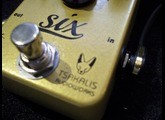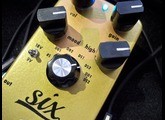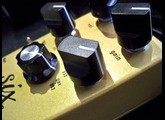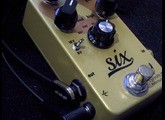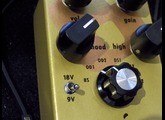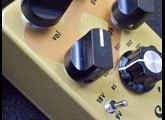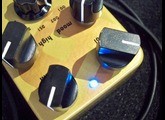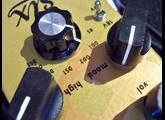« Destined to be a Classic for Sound and Diversity »
Published on 04/29/19 at 05:41
Best value:
Excellent
Audience:
Anyone
SOUND:
SIX produces a host of various tones/sounds, and overall they are very good (this may be due to the cap-less technology, viz., and capacity-free audio path). When working with dirt, SIX does a great job at hot-rodding the tone already there.
I also find it sounds best on the 18v setting unless the signal is high-gain – in such an instance 9V can be better as it is slightly more compressed and tighter. Conversely, if you choose the 18v setting (via the built-in voltage doubler) there is a fatter or bigger tone with more headroom. There are six settings, and the information sheet describes these very well. And so, when it comes to a clean channel the Booster (BS) can be very clean when keeping the Gain low (and cranking the Volume), but as you increase the Gain you get a break-up and overdriven quality. The Overdrive 1 (OD1) setting is a smooth overdrive with a lot of mids (although with more Gain you definitely get a good heft of grain in the mix). The Overdrive 2 (OD2) setting has a more compressed and ‘creamy’ quality – compressed enough that as you crank the Gain it does not get much louder, but does get thicker and fatter. Distortion 1 (DS1) has an excellent amp-like quality, whereas Distortion 2 (DS2) has that same characteristic along with added bite and aggression. The sixth setting is a combination of OD1 + DS2, which sounds awesome with both clean and dirty channels and certainly makes a tone sound extra punchy. Now, all the above descriptions apply to a dirty channel as well, although the more high-gain your amp the less you’re going to notice those characteristics (they obviously shine through on a clean channel). I tend to prefer turning down the dirty channel and cranking up SIX, as doing so sounds more natural and organic, but if I keep my dirty channel turned up (e.g., gain at 1-o’clock) then SIX’s Gain sits very well at 9-o’clock and adds to the amp’s quality. When using SIX as an add-on, your amp simply sounds like it has some added aggression and without altering the original characteristics, but regardless how you use SIX it is a fantastic natural sounding pedal that has many uses and applications. The Mood (think of it as an EQ) and the High (which brings in more high end detail) work great together to help dial in the right sounds – you can get a thick low midrange tone and still make it sparkle with added definition and harmonics by drawing in more Highs. Both are great sculpting tools for the tone.
OVERALL IMPRESSION:
Tsakalis Audioworks’ SIX is a true-bypass Swiss Army Knife of dirt, hand-built in Greece. Whether you want a clean or grungy boost, an overdrive, a distortion or a mix of drive + distortion, SIX offers a lot of great-sounding options for 210 Euro. With six modes accessible via a rotary switch, it has a very amp-like quality that sounds natural as it enhances your amp’s tones by pushing a clean channel or supplementing a dirty channel. With a built-in voltage doubler (9v or 18v via a toggle switch), you can experience an 18v setting that sounds big, boisterous and filled with plenty of headroom and punch. Or if you prefer a more sizzling compressed quality that cuts through the mix, then the standard 9v setting and adds a nice mix of saturation as you crank the Gain. The Mood knob (bass/mids/treble) not only dials into a great sounding tone, but the High knob adds that extra sparkle and zing when you want a cutting quality. SIX is a natural-sounding pedal that produces a quality analog tone that becomes an extension of your amp, rather than technology that alters your amp. It is because of this quality that SIX will become a much sought-after pedal and remain an integral part of future pedalboards, which is a tough sell since there are so many great pedals out there and only so much pedalboard space. Regardless, I’m betting SIX will become a classic and rarely sold on guitar emporium sites.
GENERAL USE:
Whether you’re running SIX through a clean amp channel or a dirty channel governs the correct dial settings. As well, the amp channel’s level of gain will have a bearing on SIX’s gain level. Let’s consider a clean amp channel so that the tone either is very clean or slightly dirty/glassy. Placing SIX’s Gain around 9-o’clock will produce a modest amount of dirt or drive, good for soft rock type chording or to give some clean lead (e.g., Blues) a touch of hair and sustain. Getting the gain upward of 12-noon and beyond (2-o’clock sounds good to my ears) makes an amp’s clean channel very dirty while verging on high-gain. When working with a high-gain channel, there are two courses of action… keep the amp’s gain moderately high (but less than usual) and add in SIX at a lower level (gain around 9-10 o’clock)… or keep the amp’s gain relatively low (9-o’clock) and add in SIX at a higher gain level (e.g., 12-noon or a bit higher). Certainly the extent of either gain setting will depend on taste and the amp in question, but I find either of these actions work well (the former of which produces a bit less noise in the signal, although overall noise level is relatively low with SIX). Here are suggestions with the other settings. SIX comes with a built-in voltage doubler (no special adapter required). A basic 9v setting produces less headroom and a steadier and smoother tone; conversely, the 18v setting offers more headroom and playing dynamics, and I find it has a more amp-like quality. The Mood knob controls the bass-mids-treble contour, whereas the High knob adjusts the degree of that high end tone and sparkle. Depending on whether you like a smoother and more compressed signal, or one that has more volume and punch will dictate if 9v or 18v works best, and certainly tone adjustment will vary among amps and tone preferences. Suffice to say there is enough range with both Mood and High that it will accommodate any dark or bright amp, as well as take away harshness from thin and brittle pickups or give more life to those muddy humbuckers.
OTHER DETAILS:
SIX is a standard sized pedal made of heavy duty, lightweight aluminum with attractive gold powder-coated paint (suggesting it’s worth its weight in gold!) and black lettering. Measuring 112 mm (L) x 60mm (W) x 50mm (H) (4.4 x 2.36 x 1.97 inches), the footswitch is heavy duty and produces a solid click when engaged/disengaged. The six-position selection switch has a very solid feel to it, also produces a solid click when moved to a different selection, and the four knobs controlling Volume, Gain, Mood and High all have good quality pots (smooth and solid when turned). The voltage toggle switch is solid when flipped and small enough to be out of harm’s way when using the footswitch. The cable input, output and power input all are located on the sides and near the footswitch, and so some care should be taken when stomping. SIX does not work on batteries and requires a standard 9VDC (center -) power supply, while consuming only 10mA.
SIX produces a host of various tones/sounds, and overall they are very good (this may be due to the cap-less technology, viz., and capacity-free audio path). When working with dirt, SIX does a great job at hot-rodding the tone already there.
I also find it sounds best on the 18v setting unless the signal is high-gain – in such an instance 9V can be better as it is slightly more compressed and tighter. Conversely, if you choose the 18v setting (via the built-in voltage doubler) there is a fatter or bigger tone with more headroom. There are six settings, and the information sheet describes these very well. And so, when it comes to a clean channel the Booster (BS) can be very clean when keeping the Gain low (and cranking the Volume), but as you increase the Gain you get a break-up and overdriven quality. The Overdrive 1 (OD1) setting is a smooth overdrive with a lot of mids (although with more Gain you definitely get a good heft of grain in the mix). The Overdrive 2 (OD2) setting has a more compressed and ‘creamy’ quality – compressed enough that as you crank the Gain it does not get much louder, but does get thicker and fatter. Distortion 1 (DS1) has an excellent amp-like quality, whereas Distortion 2 (DS2) has that same characteristic along with added bite and aggression. The sixth setting is a combination of OD1 + DS2, which sounds awesome with both clean and dirty channels and certainly makes a tone sound extra punchy. Now, all the above descriptions apply to a dirty channel as well, although the more high-gain your amp the less you’re going to notice those characteristics (they obviously shine through on a clean channel). I tend to prefer turning down the dirty channel and cranking up SIX, as doing so sounds more natural and organic, but if I keep my dirty channel turned up (e.g., gain at 1-o’clock) then SIX’s Gain sits very well at 9-o’clock and adds to the amp’s quality. When using SIX as an add-on, your amp simply sounds like it has some added aggression and without altering the original characteristics, but regardless how you use SIX it is a fantastic natural sounding pedal that has many uses and applications. The Mood (think of it as an EQ) and the High (which brings in more high end detail) work great together to help dial in the right sounds – you can get a thick low midrange tone and still make it sparkle with added definition and harmonics by drawing in more Highs. Both are great sculpting tools for the tone.
OVERALL IMPRESSION:
Tsakalis Audioworks’ SIX is a true-bypass Swiss Army Knife of dirt, hand-built in Greece. Whether you want a clean or grungy boost, an overdrive, a distortion or a mix of drive + distortion, SIX offers a lot of great-sounding options for 210 Euro. With six modes accessible via a rotary switch, it has a very amp-like quality that sounds natural as it enhances your amp’s tones by pushing a clean channel or supplementing a dirty channel. With a built-in voltage doubler (9v or 18v via a toggle switch), you can experience an 18v setting that sounds big, boisterous and filled with plenty of headroom and punch. Or if you prefer a more sizzling compressed quality that cuts through the mix, then the standard 9v setting and adds a nice mix of saturation as you crank the Gain. The Mood knob (bass/mids/treble) not only dials into a great sounding tone, but the High knob adds that extra sparkle and zing when you want a cutting quality. SIX is a natural-sounding pedal that produces a quality analog tone that becomes an extension of your amp, rather than technology that alters your amp. It is because of this quality that SIX will become a much sought-after pedal and remain an integral part of future pedalboards, which is a tough sell since there are so many great pedals out there and only so much pedalboard space. Regardless, I’m betting SIX will become a classic and rarely sold on guitar emporium sites.
GENERAL USE:
Whether you’re running SIX through a clean amp channel or a dirty channel governs the correct dial settings. As well, the amp channel’s level of gain will have a bearing on SIX’s gain level. Let’s consider a clean amp channel so that the tone either is very clean or slightly dirty/glassy. Placing SIX’s Gain around 9-o’clock will produce a modest amount of dirt or drive, good for soft rock type chording or to give some clean lead (e.g., Blues) a touch of hair and sustain. Getting the gain upward of 12-noon and beyond (2-o’clock sounds good to my ears) makes an amp’s clean channel very dirty while verging on high-gain. When working with a high-gain channel, there are two courses of action… keep the amp’s gain moderately high (but less than usual) and add in SIX at a lower level (gain around 9-10 o’clock)… or keep the amp’s gain relatively low (9-o’clock) and add in SIX at a higher gain level (e.g., 12-noon or a bit higher). Certainly the extent of either gain setting will depend on taste and the amp in question, but I find either of these actions work well (the former of which produces a bit less noise in the signal, although overall noise level is relatively low with SIX). Here are suggestions with the other settings. SIX comes with a built-in voltage doubler (no special adapter required). A basic 9v setting produces less headroom and a steadier and smoother tone; conversely, the 18v setting offers more headroom and playing dynamics, and I find it has a more amp-like quality. The Mood knob controls the bass-mids-treble contour, whereas the High knob adjusts the degree of that high end tone and sparkle. Depending on whether you like a smoother and more compressed signal, or one that has more volume and punch will dictate if 9v or 18v works best, and certainly tone adjustment will vary among amps and tone preferences. Suffice to say there is enough range with both Mood and High that it will accommodate any dark or bright amp, as well as take away harshness from thin and brittle pickups or give more life to those muddy humbuckers.
OTHER DETAILS:
SIX is a standard sized pedal made of heavy duty, lightweight aluminum with attractive gold powder-coated paint (suggesting it’s worth its weight in gold!) and black lettering. Measuring 112 mm (L) x 60mm (W) x 50mm (H) (4.4 x 2.36 x 1.97 inches), the footswitch is heavy duty and produces a solid click when engaged/disengaged. The six-position selection switch has a very solid feel to it, also produces a solid click when moved to a different selection, and the four knobs controlling Volume, Gain, Mood and High all have good quality pots (smooth and solid when turned). The voltage toggle switch is solid when flipped and small enough to be out of harm’s way when using the footswitch. The cable input, output and power input all are located on the sides and near the footswitch, and so some care should be taken when stomping. SIX does not work on batteries and requires a standard 9VDC (center -) power supply, while consuming only 10mA.

